Posted by
Mordy Oberstein
It’s always nice when theory meets reality. Not too long before I undertook the research for this study I wrote an article about why I thought Featured Snippets would be getting shorter. To be honest, I was not expecting my search marketing prophecy to come true so soon. However, when I noticed that Google was throwing content barely a few hours old into Featured Snippets it seemed the content within them was a bit on the thin side. Thus, I took to analyzing 150 Featured Snippets to see if my anecdotal observation was correct.
Long story short, Featured Snippets are shorter… sort of.
On the Average Length of Featured Snippets: Then & Now
As I mentioned, I started to get this sneaking suspicion that Google was shortening the length of the content found in your average Featured Snippet. So I did what any logical person would do: I took 150 Featured Snippets that appeared on the SERP between 2016 and the end of September 2018 (aka the end of Q3 2018) and compared them to the Featured Snippets that currently appear on the SERP.
In other words, I looked at actual Featured Snippets that were shown on the SERP between the start of 2016 and September 30th, 2018 and counted up the number of characters within each snippet. I then brought up the current Featured Snippets for the same 150 keywords and counted up the number of characters. Naturally, I then proceeded to compare the number of characters within the Featured Snippets of yesteryear to the current incarnations seen on the Google SERP.
It should be noted, that I only compared Featured Snippets of the same format. That is, if a Featured Snippet was presented in paragraph form in say 2017 but currently appears as a list Featured Snippet, I did not use it for this study. The reason for this is obvious, Google tends to use different character allotments for each type of SERP feature.
Lastly, I analyzed paragraph and list Featured Snippet formats only. I did not look at any tabular Featured Snippets as it was generally too cumbersome to count the characters within them.
That said, would you like to see what I found?
How Long Are Featured Snippets These Days?
I mentioned that Featured Snippets contain fewer characters than they used to, but that is not across the board. In fact, the length of a Featured Snippet in 2019 is actually longer than it was prior to Q3 of 2018. (We’ll get to how I can state that Featured Snippets are shorter these days in just a bit.) Looking at all 150 Featured Snippets I analyzed the length of your average Featured Snippet is seven characters longer than what it was just a few short months ago.
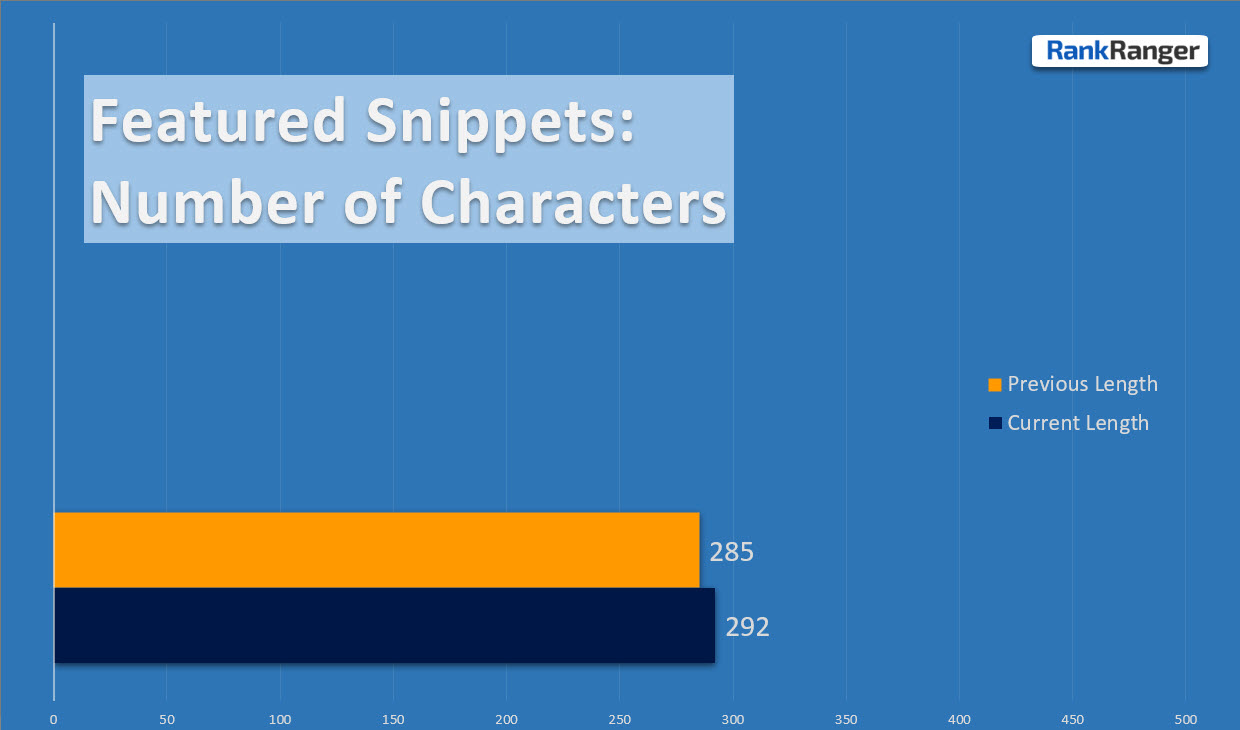
On average, and regardless of format, Featured Snippets now contain seven more characters than previously
However, to get an accurate understanding of what is going on in regards to the length of Featured Snippets we need to breakdown the SERP feature by its various formats. For our purposes that means analyzing the length of both list and paragraph Featured Snippet formats separately.
Check out our guide to winning SERP features.
The Length of Featured Snippets in List Format
Featured Snippets that contain a list (either as bullets or a numbered list) are about 9% longer in 2019 than they were prior to the end of Q3 in 2018. Specifically, the average list Featured Snippet now contains 315 characters whereas the format used to consist of 289 characters.
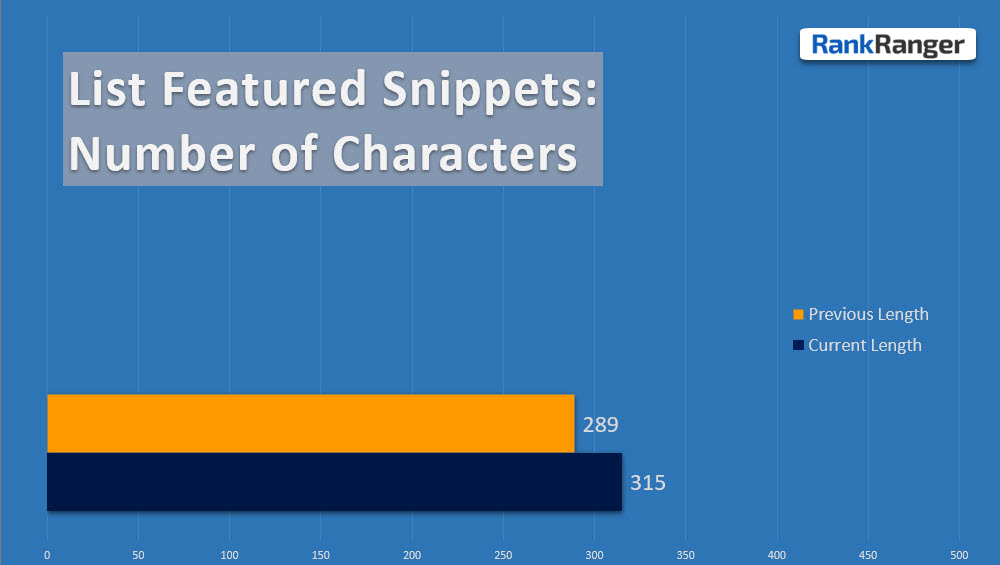
Accentuating the overall trend, list Featured Snippets are a now a full 26 characters longer
That is, I pulled out 75 “list” Featured Snippets from the overall dataset (that’s exactly half of the total number of Featured Snippets analyzed) and found that the format is 26 characters longer than it used to be. That aligns to the overall dataset which has snippets being seven characters longer than they once were.
Now, Google adding more content to list Featured Snippets does not equate to them being less efficient with their wording. In fact, one of the common themes when comparing older list Featured Snippets with their more modern counterparts was the removal of content bloating. Google has gotten better at stripping these Featured Snippets of unneeded and unrelated content despite there being more characters.
Here’s a Featured Snippet for the keyword top online shopping sites from January 2018:
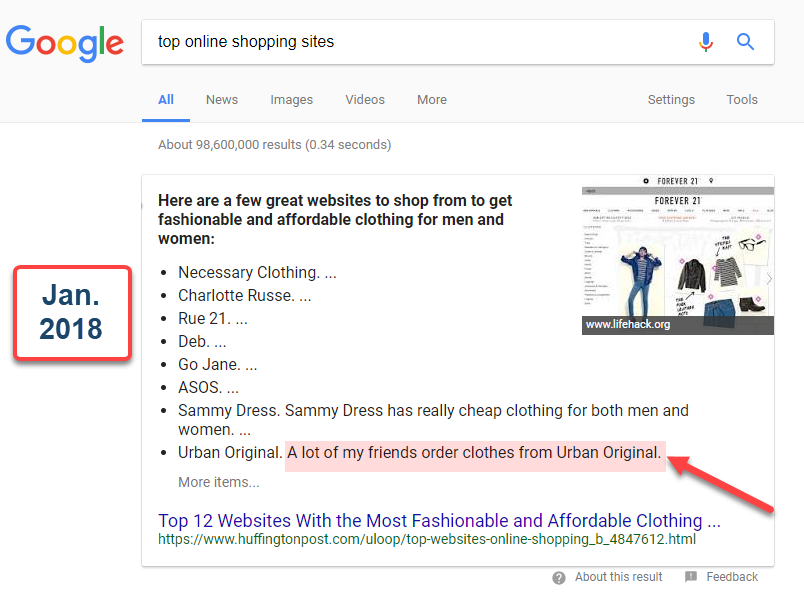
There is no reason I need to know that the author’s friends order clothing from Urban Original. I really don’t care. Hence the 2019 version of this Featured Snippet has no such content:
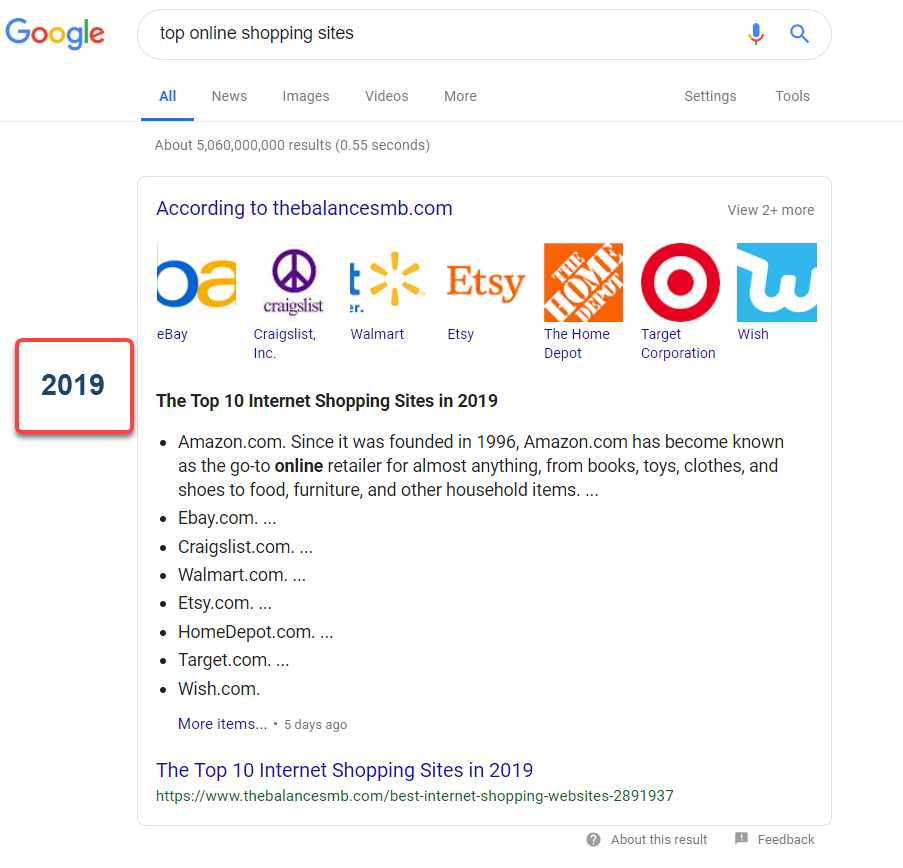
Aside from a short description of Amazon (which is not entirely irrelevant), all we get is a nice list of online stores. Notice, the stores listed in 2019 are far less obscure than what was shown previously. Also, the title/header leading off the list in 2019 is far more succinct than what was shown in early 2018. Which is interesting because the 2019 Featured Snippet is 26 characters longer than the older version.
By the way, it was my experience that the same improvements apply when the current Featured Snippet is shorter than what it once was. I found the 2019 version of the Featured Snippet showing for the keyword how to bake a cake to be 38 characters shorter than what it was in April 2018 despite Google using the same URL in both!
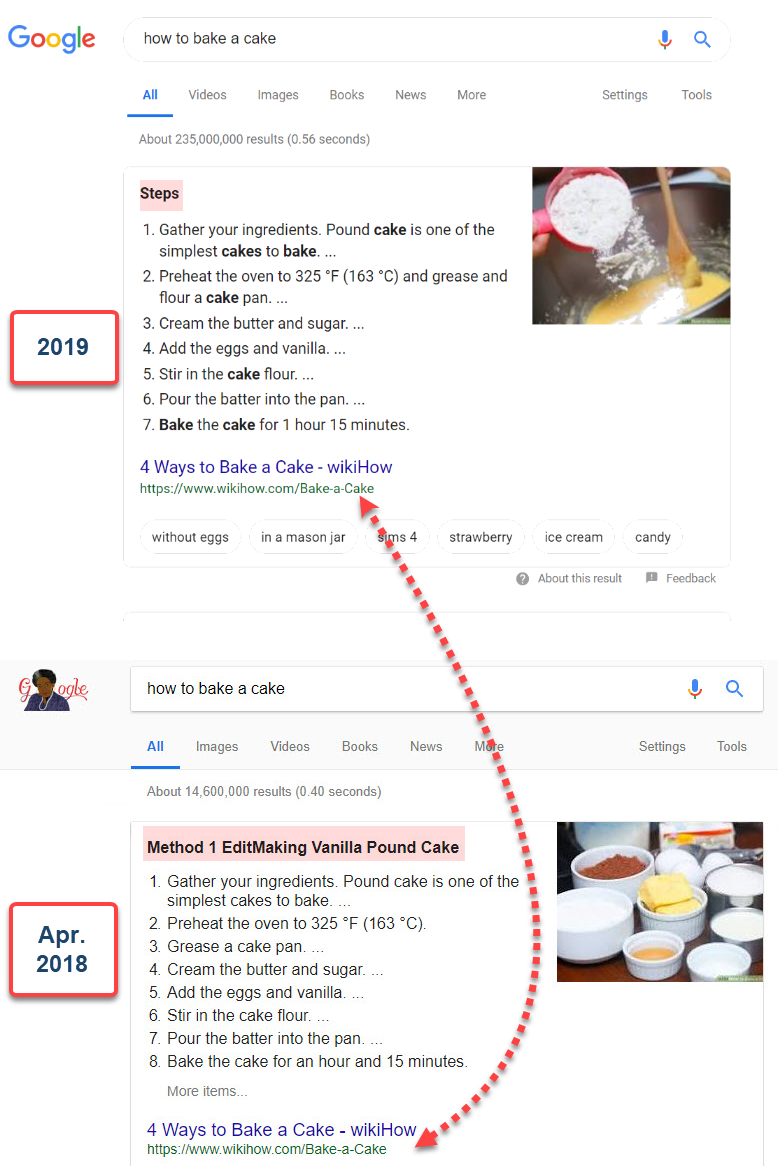
Despite the same URL showing both inside the April 2018 and 2019 version of the Featured Snippet, the more recent incarnation is 38 characters shorter
What happened to make the current snippet shorter? The header leading the list. If you’ll look above, Google did away with the inefficient and a bit bizarre heading of Method 1 EditMaking Vanilla Cake for the far more comprehensible Steps!
[Note, Google also did away with the ‘More items’ button, thereby indicating that the list shown is the complete list and that there is less of a need for a click.]
It’s pretty clear that while Google has increased the character count within list Featured Snippets it has done so in spite of presenting more efficient content within them.
Why Are List -Type Featured Snippets Longer?
There’s a general trend towards Google offering a more complete information experience on the SERP. This takes the form of both more types of “Google” content as well as more complete answers within Google’s SERP features. For list versions of Featured Snippets, this means more content. (In a moment I’ll show you why this does not apply to all Featured Snippet formats). If Google wants a list Featured Snippet to serve as a comprehensive answer it may mean adding more content. (Interestingly, the average number of bullets/numbers within a given list Featured Snippet has not changed and stands at 6.6 both now and prior to the end of 2018’s third quarter.)
When dealing with a list, the more complete that list is (qualitatively), the more the headers are targeted, the more the list items are qualified, the better it can serve as a Direct Answer would. Which is not the case when dealing with paragraph Featured Snippets.
Paragraph Featured Snippets Are Now Shorter
Now for the fun part. Featured Snippets of paragraph form are roughly 5% shorter than they used to be. The average paragraph Featured Snippet now contains 269 characters whereas that number used to stand at 283 characters.
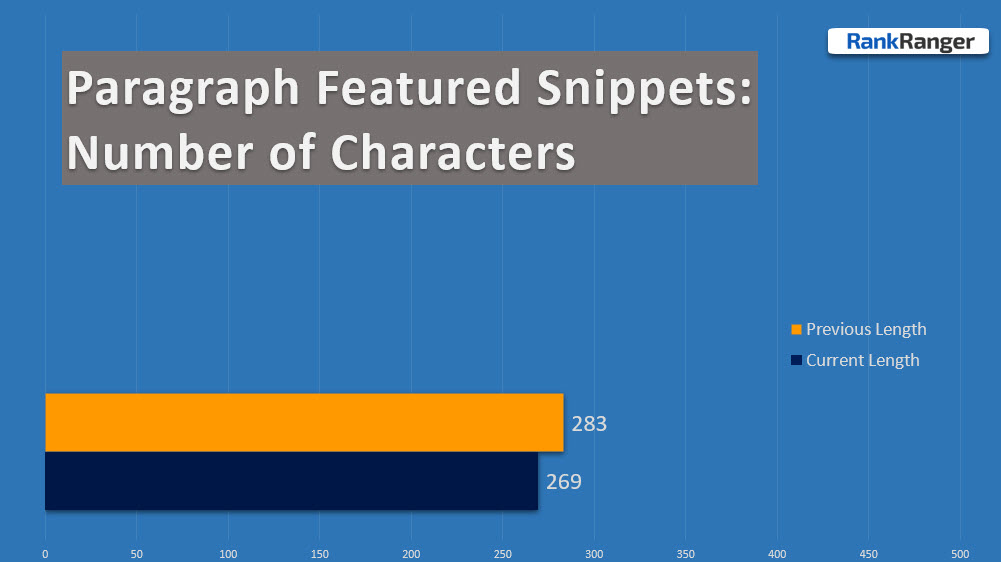
Google has been shortening the length of paragraph format Featured Snippets
14 characters might not sound like a lot. In truth, from what I can gather, that comes out to about three fewer words being used within a paragraph Featured Snippet. That’s not an exorbitant reduction, though it still is something to note and consider. However, you have to keep in mind that this is the average. The number of fewer characters is important (and is significant despite boiling down to three or so fewer words) but the trend itself is of equal importance. That is, we have to ask what fewer Featured Snippet characters means qualitatively.
To help us understand just that here’s what a Featured Snippet looks like with 101 fewer characters:
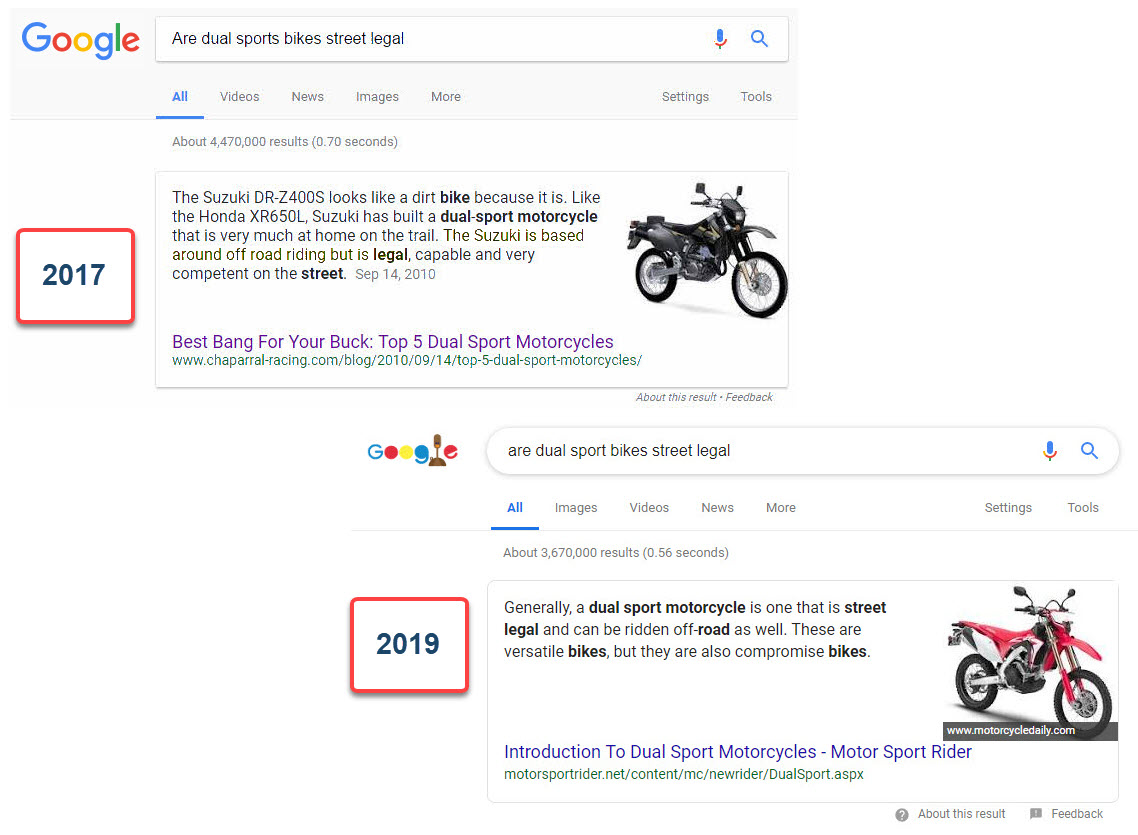
First off, the original Featured Snippet from 2017 was not exactly War and Peace, it was pretty concise to begin with and even stands well under the current and reduced average of 269 characters. This already slim incarnation now looks almost bareboned and doesn’t even run more than three paltry lines. As you all well know, the shorter the content, the more likely it will be read.
Now, are you ready for why the character reduction here really matters?!
I’d like to ask you to go back and read the Featured Snippet from 2017 if you haven’t already because it hardly answers the question that is the query. It’s only in passing that we learn that a dual sports bike is street legal and even so we can only infer that this specific model is street legal.
Compare that to the 2019 version where we are told explicitly that dual sports motorcycles are generally street legal. The character reduction was carried out not because Google thinks shorter content is more readable content. Rather, Google is reducing the number of characters in paragraph Featured Snippets because it is better at dispensing information that directly aligns to the query. Shorter here means a more targeted and more complete answer.
What Shorter Paragraph Featured Snippets Mean for Search Marketers
Google’s goal, as I see it, is to use site content much the way it would implement Google curated content, as a Direct Answer. Take the keyword universe origins, whose Featured Snippet is now 121 characters longer than it used to be. But longer per se is not a problem to the Direct Answer equation. If Google’s goal is to better use Featured Snippets as Direct Answers, that may mean offering more content.
That becomes clear when we actually compare the current Featured Snippet (at the time of this writing) to the previous version for the keyword universe origins:
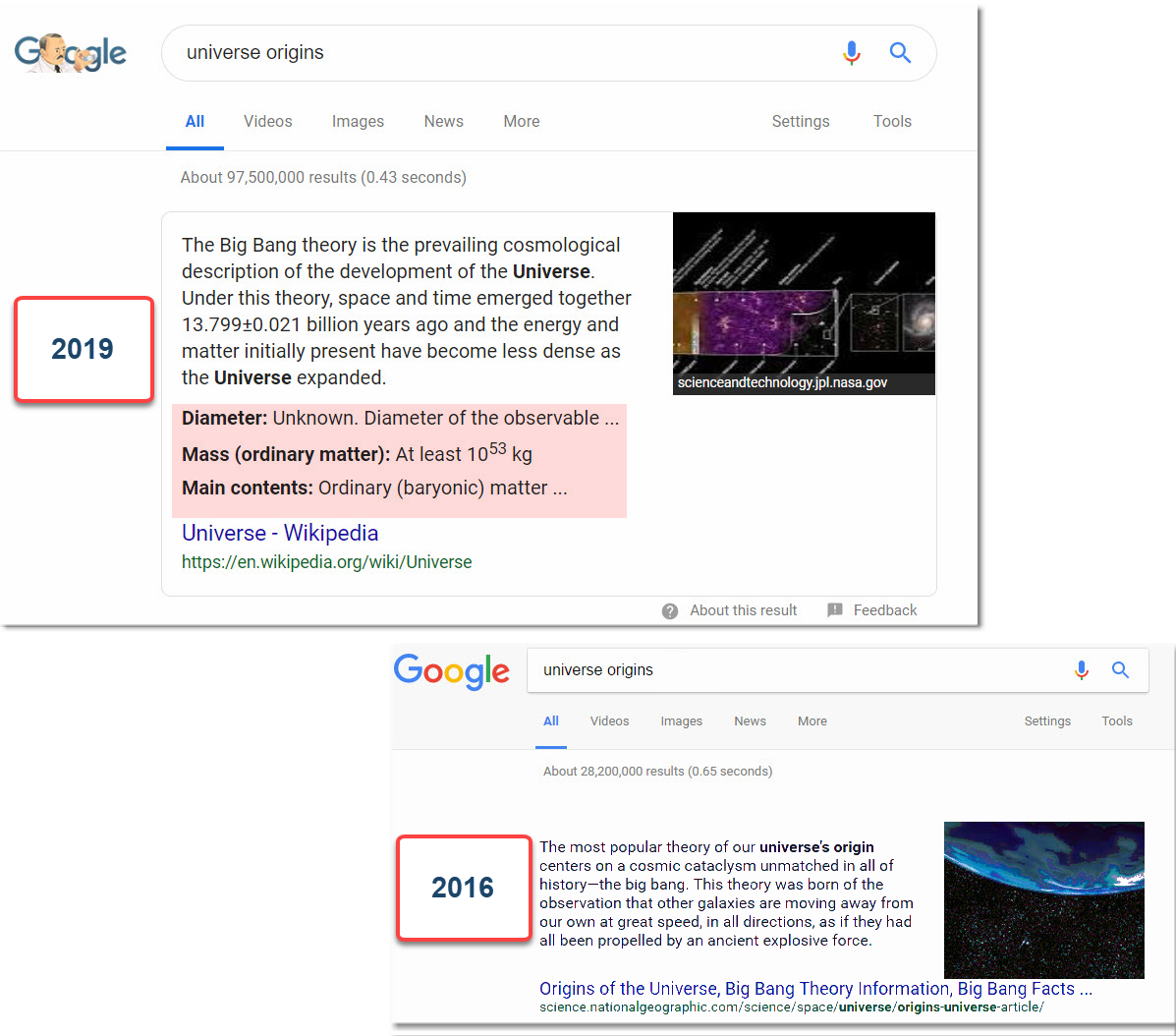
The 2019 version of the Featured Snippet contains ancillary information to better anticipate the user’s next quest, knowledge of the universe’s size. In this case, and as is ‘most curious’, Google not only pulled content from the main body of the page but from a side box as well so as to offer a more layered answer with content that one would expect to see in a Direct Answer.
While more content within a paragraph Featured Snippet can better help it serve as a Direct Answer, it is not the prevailing paradigm. In general, the more focused and refined the content within a paragraph Featured Snippet is, the better it can serve as a powerfully concise response to the query. Which is why despite cases of longer paragraph Featured Snippets relative to the past, it is not the current trend. Here, as opposed to the list format, concision more or less inherently equates to answer directness and therefore to answer potency.
All of this, of course, and as I laid out in my Search Engine Land article on the future of Featured Snippets, means that users may be less inclined to click on a paragraph Featured Snippet’s URL. (I would say the same for the list format as well, but because it has more, not shorter content. That is, the definition of a potent and complete answer is not related to its concise nature, at least where list-type Featured Snippets are concerned.)
Father Time and the Fading of Featured Snippets

When I say Featured Snippets are fading, I don’t mean fading, as in fading off the face of the SERP. Rather, as time goes on, one would have to assume that Google will get better at Featured Snippet refinement. That means the continuing process of turning the SERP feature into a lean mean Direct Answer machine (for the paragraph form). Featured Snippets are already hard. For the keywords that really matter it’s hard to unseat a URL sitting inside a Featured Snippet. With Google shortening paragraph Featured Snippets and adding more content to the list version as well, traffic may be a bit harder to acquire via the SERP feature.
That said, and as I’ve mentioned elsewhere, Featured Snippets will always be a win. More than that, having your URL placed in front of a user’s eyes in such an authoritative manner (as comes with being at the tippy top of the SERP) is a big brand win! Perhaps with paragraph Featured Snippets coming in at a paltry 269 characters, people will start to talk up the branding advantages of the zero-position box. Perhaps.

